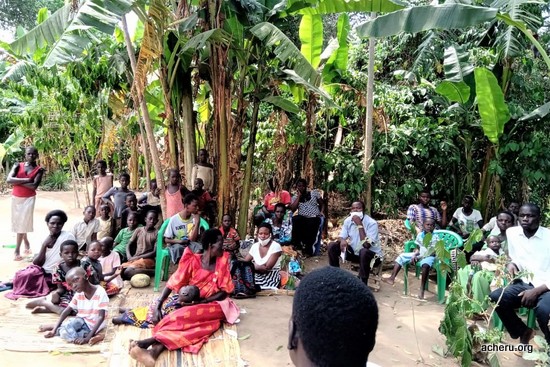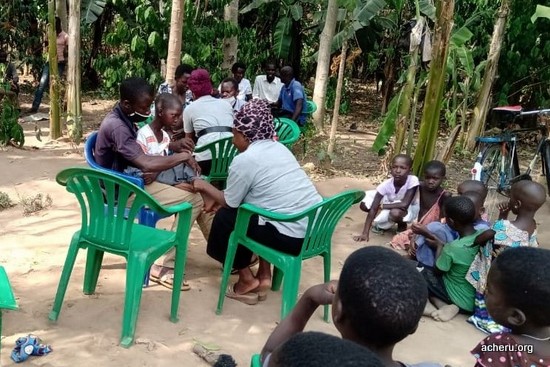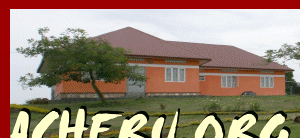|
|
| April 2021 report: The continuing impact of Covid, and recent community reports |
| It's now over a year since I wrote about how Covid was starting to affect our work here and in Uganda and I couldn't have imagined then that it would continue to have such an impact. I have been working from home instead of at the office, and spending varying periods of time at the store depending on what equipment has come in. It's been difficult not being able to meet with people, it's simply not the same struggling with technology to communicate 'on line' or discussing business on the phone instead of meeting face to face. The work with medical equipment has been more difficult as I am reluctant to bring in volunteers, with the risks associated with people working closely together. This has slowed down much of what we do. |
| I'm often asked about the extent of Covid infections in Uganda. I don't know. Much like we saw years ago with the spread of AIDS, it's very difficult to gauge the real extent of the problem. It was clear enough at first, with returning overseas travellers testing positive for the virus and clusters of cases around those returning from other countries but as it spread more widely, so the limited testing available has masked the true scale of the problem. Despite what appear to be relatively low official figures for Covid, earlier this year Ugandan newspapers were reporting: "Covid 19 Numbers Soar, Government loses grip, deaths rise" and "The country seems on FIRE! Covid 19 is taking a heavy toll across the country with 70 districts already bombarded with the disease". |
| Extracts from a report received from Rose, 25th March: |
| 'Coronavirus has changed people's lives in many ways. Many have lost their lives and fear has left others severely depressed. There are changes everywhere, and Acheru has been affected as well. Fewer clients could be followed up, and the staff were also afraid of being infected. Transport costs doubled, and many couldn't afford to come to Acheru. Disabled children became a very low priority for families who lost their income. Community visits were made more difficult because of travel restrictions and a curfew. |
| The CBR team found that Covid resulted in a number of families separating; jobs were lost and there was a lot of domestic violence. Disabled children might be abandoned with the mother or grandmother who struggled to feed them, and there's a lot of malnutrition. Stress and depression is common, people lose hope and many consider suicide so the CBR team must try to provide counselling and guidance. The team's work is also hindered by those who think Covid isn't real and refuse to take precautions. The CBR team has been trying to educate people on how to protect themselves.' |
| A few months ago the government made it clear that the responsibility was on individual Ugandans to take care of themselves, the Minister of Health stating: "We did our part, we sensitized the masses, urged them to wear face masks, hand wash, and social distance, but Ugandans are very hard people to handle". When health facilities filled up, Covid 19 cases were no longer allowed in the wards and were referred to seek treatment at home. Health officials could no longer track patients to ascertain whether they had recovered. The Ministry of Health said "People are dying with no effort by government to trace the contacts let alone record the deaths. What is captured as deaths or recoveries are official numbers of those admitted in government health facilities. Many who are sent home after testing positive end up dying unobtrusively at home." |
| The information I get from doctors there shows firstly that testing is not widespread, and secondly that many more older people are dying than would normally be expected, with Covid likely to be a significant factor. Uganda has a relatively young population, so while older people may be badly affected most people are relatively unaffected or show no symptoms. The main difficulty from our perspective has been the restrictions on travel. It can be difficult for patients to travel to Acheru or to our clinics, and this will inevitably mean many more conditions will have gone untreated and will be much worse when we do eventually see them. During a period when travel was severely restricted, our Acheru pickup was used by the district administration to deliver food to villages, and this was an opportunity to make the work of Acheru more widely known. At Christmas, when it wasn't possible to have our usual parties, the community team visited people, bringing produce from the Acheru farm to those in particular need - and gaining an insight into the difficulties caused to people struggling to access food or medical treatment. |
| Report from Rose Nakabugo: |
| Community outreach, 5th February 2021 to Irundu village in Buyende district (eastern Uganda). Organised by the Acheru Community Based Rehabilitation team of Harriet and Rose to sensitize the community and create awareness of the causes, effects, and prevention of disabilities, and also to follow up on former patients to review their condition, and for the assessment and identification of new clients. This was some distance from Acheru so the arrangements were made with community leaders by a girl from the area who made a good recovery after Acheru treatment. She visited a number of villages to tell them about the work of Acheru and the planned visit. |

|
| Buyende |

|
| Buyende community outreach Feb 2021 |
| The district is remote, difficult to locate with almost impassable roads, and the team set out very early in the morning. It's a beautiful and fertile area, where the people keep cows and grow rice, cassava, maize, and bananas. Local people say the only thing keeping them poor is the poor access preventing them taking produce to market. The CBR team reached the village in the afternoon to find clients patiently waiting to hear from them. An introduction was given with an outline of Acheru's work. 15 potential patients were then assessed, their conditions including cerebral palsy, knock knees, and leg deformities. Most of these children had never visited hospitals, and with a lack of health education people tended to blame witchcraft. In discussions with clients, there was sharing of the likely causes of disabilities and how they might be treated. It was a long day with travel so difficult and the team arrived back very late at Acheru. (Because of the dangerous roads, we try to avoid travel at night. This trip took much longer than anticipated, so for any further visits, the team will stay overnight.) |
| Follow up is now being planned. Based on what was found on the visit the team realised that continuing visits are necessary. Many people did not show up because of lingering doubts, but if the team continues to provide counselling and guidance it will help to create a change in their views and eventually extend our influence. For a one day visit, valuable work was done, with evidence of a huge need. There are many children out there with no knowledge or information on units like Acheru, and they have no idea their deformities can be treated. |
|
|
|





